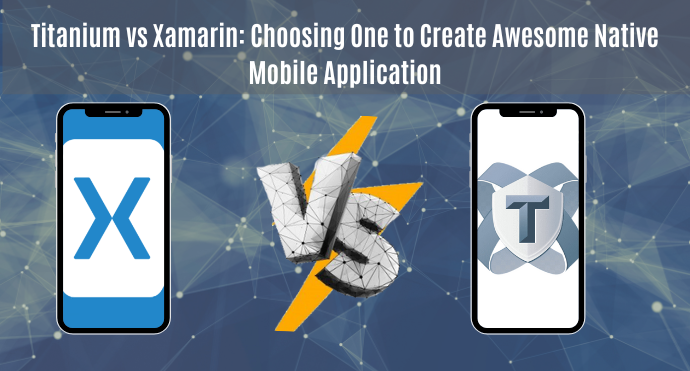Creating awesome mobile applications is a must for any business to reach a wide audience and remain popular. The two most popular native mobile application development frameworks are Titanium and Xamarin. Both have their own benefits and drawbacks.; it comes down to the developers’ preferences and project requirements.
When it comes to developing native mobile applications, there are many options available in the market. Two of the most popular platforms for developing mobile apps are Titanium and Xamarin.
Titanium is an open-source platform that allows developers to create native mobile applications using JavaScript. It provides developers with a single codebase that can be used to create apps for multiple platforms, including iOS, Android, and Windows.
On the other hand, Xamarin is a cross-platform mobile app development framework that uses the C# programming language. Xamarin allows developers to create native mobile applications for iOS, Android, and Windows using a single codebase.
Both Titanium and Xamarin have their pros and cons, and choosing one over the other depends on the specific needs of your project. Let’s take a closer look at some of the key differences between these two platforms.
Ease of Use
When it comes to ease of use, both Titanium and Xamarin have their strengths and weaknesses. Titanium is relatively easy to learn, as it uses JavaScript, a widely-used programming language. This makes it an excellent choice for developers who are already familiar with JavaScript and want to use it for mobile app development.
On the other hand, Xamarin uses the C# programming language, which may be more challenging to learn for developers who are not familiar with it. However, Xamarin also provides a visual designer tool that allows developers to create UI elements for their mobile apps without having to write any code.
Performance
When it comes to performance, both Titanium and Xamarin are capable of delivering high-quality native mobile apps. However, there are some differences between the two platforms.
Titanium uses JavaScript, which can sometimes result in slower performance compared to native code. However, Titanium has a built-in compiler that converts JavaScript code into native code, which can improve performance.
Xamarin uses C# code, which is compiled into native code for each platform. This means that Xamarin apps are generally faster and more efficient than Titanium apps.
Community Support
Both Titanium and Xamarin have large and active communities that provide developers with access to a wealth of resources and support. However, there are some differences between the two communities.
The Titanium community is relatively smaller compared to Xamarin, but it is still large and active. Developers can access a variety of resources, including documentation, tutorials, and forums.
The Xamarin community is much larger than Titanium and includes a vast number of resources and tools. Xamarin also has excellent documentation and support, which can be beneficial for developers who are just starting with the platform.
| | Titanium | Xamarin |
| Programming language | Titanium uses JavaScript | Xamarin uses C# |
| Performance | Titanium has been criticized in the past for being slower than other native development options. | Xamarin is known for its fast performance. |
| Development time | Titanium is designed to be a rapid development platform, allowing you to create apps quickly and easily. | Xamarin can be a bit more complex to use, but it also offers more control over the development process. |
| Cross-platform capabilities | Titanium is more focused on iOS and Android development. | Xamarin offers more flexibility when it comes to creating apps for iOS, Android, and Windows. |
| Ecosystem | Titanium is owned by Appcelerator, which has a smaller community and fewer resources available. | Xamarin is owned by Microsoft, which gives it access to a large ecosystem of tools and resources. |
| Platform Compatibility | Titanium also supports development for BlackBerry and Tizen platforms. | Xamarin supports development for iOS, Android, and Windows devices |
| Development Approach | Titanium uses a single codebase to create a shared UI across platforms. | Xamarin provides a more traditional approach to mobile app development, where the app’s user interface is built separately for each platform. |
| Ecosystem | Titanium is an open-source platform that relies on the community for support and resources. | Xamarin is owned by Microsoft, which provides a rich ecosystem of tools and resources to support app development. |
| Cost | Titanium offers a paid version with additional features and support. | Xamarin requires a paid subscription to access certain features and support. |
| User Interface (UI) Design | Titanium offers more flexibility in UI design, as it allows developers to use web technologies such as HTML, CSS, and JavaScript to build UI components. | Xamarin, on the other hand, offers more native UI controls, which may provide a better user experience on each platform. |
Conclusion
Choosing between Titanium and Xamarin depends on the specific needs of your project. Titanium is an excellent choice for developers who are already familiar with JavaScript and want to create native mobile apps for multiple platforms.
Xamarin is an excellent choice for developers who want to create high-quality native mobile apps using the C# programming language. Xamarin also has a larger and more active community, making it an excellent choice for developers who need access to a wealth of resources and support.
Source Link: https://bit.ly/40Sqeba
